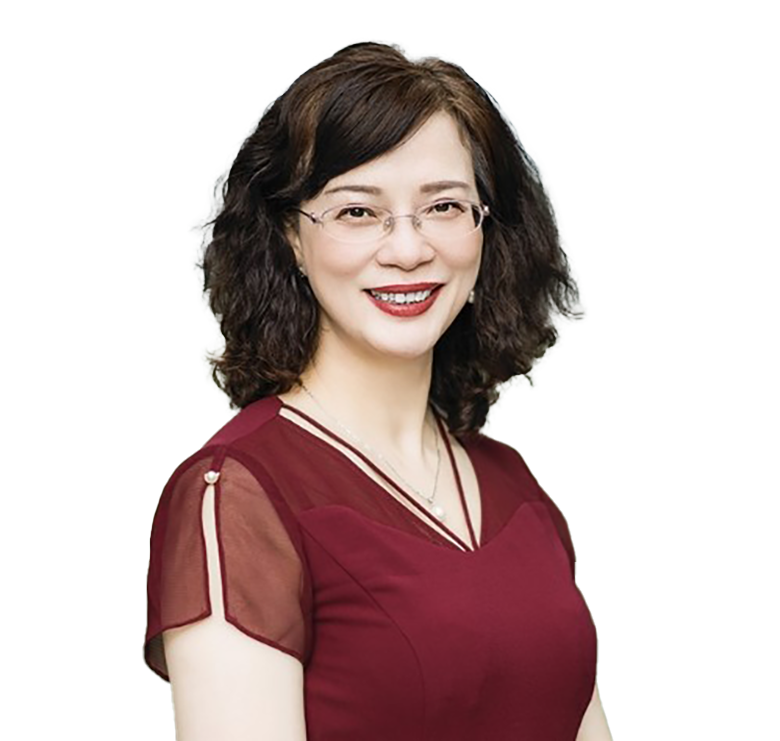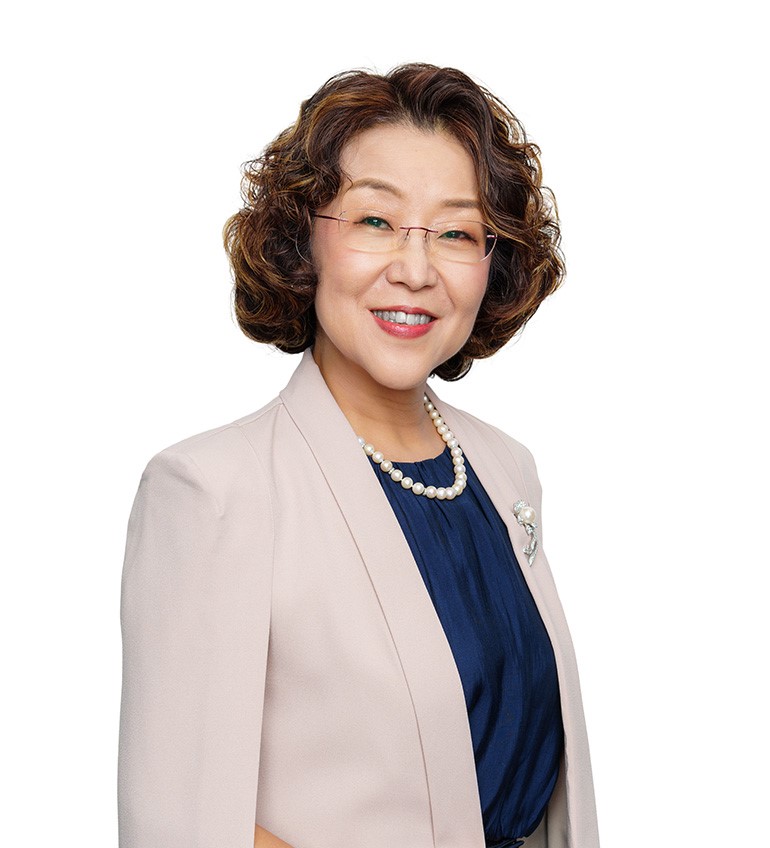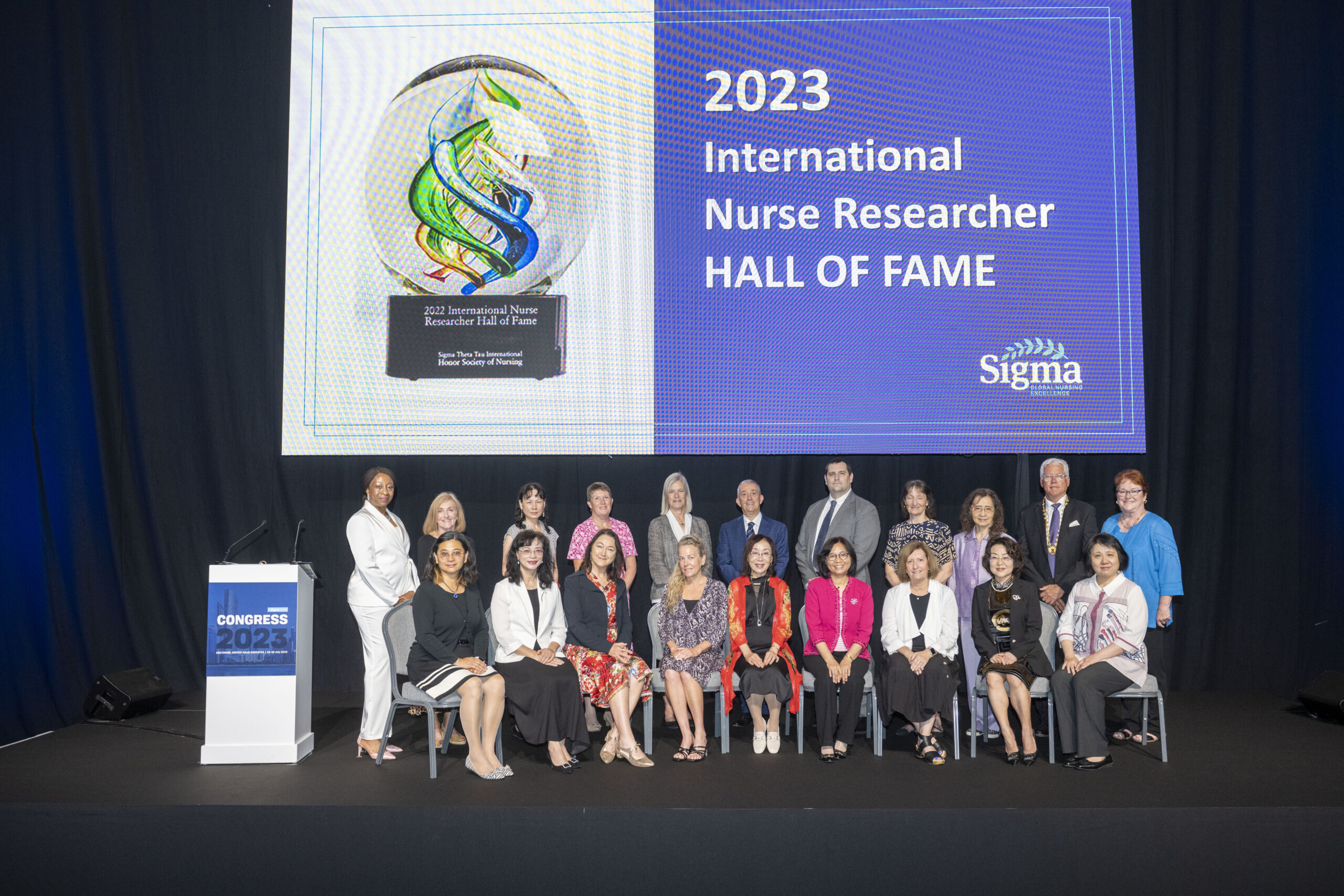
Professors He Hong-Gu Linda and Wang Wenru share their thoughts on receiving the prestigious award, their secrets to a long research career—and the key to having a high H-index.
On being inducted into the 2023 International Nurse Researcher Hall of Fame.
Prof Wang: It’s a great honour. Sigma Theta Tau International is one of the largest Nursing societies globally—with strict membership criteria. Amongst over 135,000 current members and 525,000 lifetime members spread over 540 chapters, only 20 to 30 Nursing researchers worldwide are inducted into the Hall of Fame each year.
Prof He: Yes, and more than recognition of our personal contributions to Nursing research—this is also a recognition of NUS Nursing’s growing significance in the international space. NUS Nursing’s vision is to become the top Nursing school in Asia, and this marks one more step towards that goal.
On the 34th International Nursing Research Congress in Abu Dhabi.
Prof Wang: For me, the award ceremony was most memorable. Different from traditional ceremonies where you simply receive your award, we were engaged in a panel discussion where we answered questions and shared tips for aspiring Nursing researchers. It was also an interesting experience to hear from other inductees.
Prof He: What struck me most was this particular session where we were supposed to share our research experience. Our moderator from Africa came up to me and said, “I am so honoured to moderate your special session. I want to be on stage [as an awardee] like you one day. If not me, one of my students. Could you help us get there?” That left a deep impression on me. Since then, we have been connecting and looking for chances to collaborate. I hope to help them achieve their aspirations.
On research beginnings and interests.
Prof He: My research interest in maternity care was sparked by my clinical and teaching experience in obstetrics and gynaecology before my graduate studies. Subsequently, during my Master’s and PhD studies in Finland, I was influenced by my supervisors’ remarkable research endeavours and followed their path to conduct studies in pain management in children. After getting my PhD and moving to Singapore, my research continued along similar lines in women and children healthcare. However, I have also broadened my focus to include cancer care and chronic illnesses, partly inspired by the research passions of my students and healthcare burden in Singapore due to increasing number of patients diagnosed with cancer and other chronic conditions. Moreover, over the past 5 years, I have integrated technology into my interventional studies, leveraging platforms such as mobile applications and websites to provide more cost-effective and sustainable care to clients.
Prof Wang: My research journey started from my Master’s and PhD work almost 30 years ago. Then, my 2 years’ experience working in a cardiac care unit provided the foundation for my first study on patients with acute myocardial infarction—and later on, my research focus. Today my research generally focuses on chronic illnesses and long-term care, specifically for cardiovascular health and cardiac rehabilitation. That said, I proactively explore beyond my research focus, staying up-to-date on the latest developments in healthcare—including major issues the Singaporean population is facing. These inform my research direction.
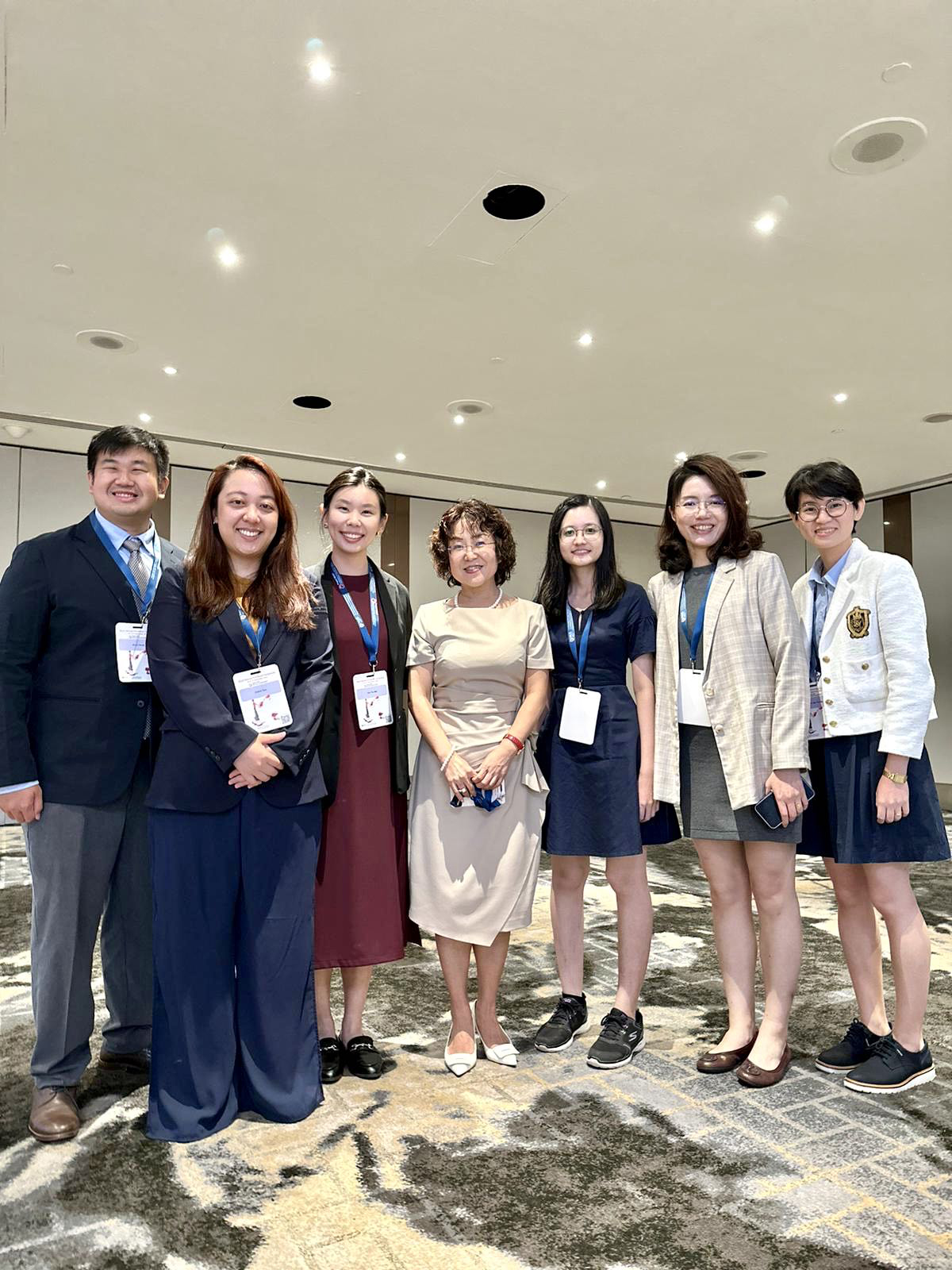
Prof Wang Wenru with her research team.
On working in interdisciplinary research teams.
Prof He: It’s probably outdated to describe what we do today as ‘Nursing research’. We often work with other healthcare professionals like doctors, physiotherapists, psychologists, computer engineers and so on to address patients’ needs and provide patient-centred care more holistically and effectively.
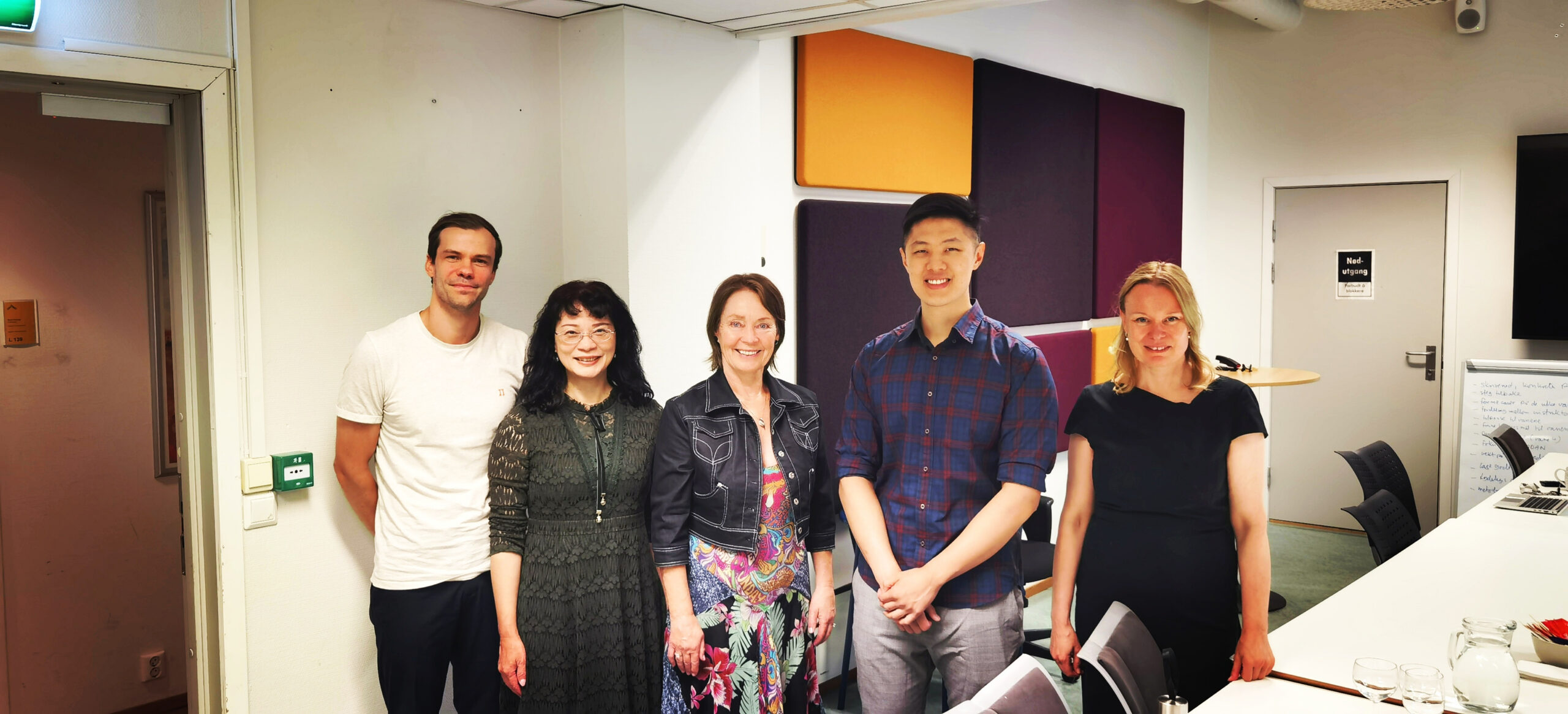
Prof He Hong-Gu Linda with her international team of Spinal Disorder project.
Prof Wang: And with technological advancements, it has become very much easier to collaborate with experts from other areas like data scientists and artificial intelligence (AI) engineers—although communication can be quite challenging at times because we all have our own ‘language’. But when we overcome that hurdle, findings are usually richer than if we were to conduct the studies in silo. Actually as long as we listen closely and try to understand what each person is trying to convey, we can usually get onto the same page. After all, there is a common desire to achieve the project’s goals.
Prof He: That is true. Researchers are usually nice people! With patience and mutual respect, it’s not too difficult to come to a consensus.
On the challenges of research.
Prof He: Our research is mostly conducted on the basis of randomised controlled trials. Naturally, having an adequate number and the right profile of participants is central to the success of our studies. This is where stakeholder support from the clinical staff and hospitals is important. It helps that NUS Nursing is part of the National University Health System (NUHS). Support from other hospitals such as KK Women’s and Children’s Hospital (KKH), Singapore General Hospital (SGH) and Tan Tock Seng Hospital (TTSH), has also been amazing in terms of collaborations. These connections make it easier for us to reach out and gain access to prospective research participants.
Prof Wang: Yes—communication is important not just among the researchers, but also with other stakeholders. As Hong-Gu shared, we need their support to complete the research—and very often they also offer useful insights into the viability of implementing our recommendations in the hospital setting. But a more important reason for engaging with them is to get their buy-in. Without that, we won’t be able to translate our research into actual clinical practice even if the interventions we have developed are beneficial to patients.
On a significant research project.
Prof Wang: An ongoing one comes to mind. Centre-based rehabilitation programmes are proven to improve quality of life and patient prognosis—but have traditionally low take-up rates. That prompted us to trial a cardiac telerehabilitation programme which targets post-aortic insufficiency or post-myocardial infarction patients. However, for this clinical translation project to achieve the positive outcomes and improve take-up rates, we had to rally the support of the whole team at National University Hospital (NUH) Cardiac Rehabilitation Centre—from cardiologists to nurses and allied health professionals. Although that meant extra work on top of their already hectic schedules, everyone was supportive. We are still in the early days of the project, but we are seeing good progress.
Prof He: Mine would be a research project, iCanManage, to create a smartphone app to improve health outcomes for colorectal cancer patients and caregivers. This was a complex project involving multicentre and international collaboration. Apart from having to coordinate with participating institutions—NUH and SGH, we also had to manage the communication with our Finnish collaborators in a different time zone. Despite the complexity, it was very exciting to work with such an interdisciplinary team—where like-minded individuals contributed respective expertise to make things work. Moreover, we are happy that patients and their caregivers benefitted from the project, especially during the challenging COVID-19 pandemic, and other hospitals showed interest in scaling up the project.
On growing the H-index.
Prof He: Working hard is a given. But consistency is just as important—as long as you keep working and publishing, it will grow with time. My H-index today is a result of the research I have completed over two decades with my research students and collaborators.
Prof Wang: Teamwork is important. At any one time, we are involved in 10 to 20 projects—but there is no way Hong-Gu and I can write 20 papers a year on our own. By working closely with our PhD students and research fellows, this becomes achievable.
On work-life balance.
Prof He: As a pioneer faculty member in NUS Nursing, I, along with my colleagues like Wenru, devote great efforts to helping the growth of our young department and advancing its vision and mission to become one of the world’s top nursing schools. But I try to take care of my health and make time for my family. Most importantly, I enjoy my work with a positive attitude. I always tell my students: We are allocated 24 hours every day and spend at least one-third of it working. We should enjoy what we do so that our working time is spent happily and meaningfully.
Prof Wang: I agree with Hong-Gu—it makes all the difference when you enjoy what you do and work well with your colleagues and collaborators. That is also probably why we have been able to continue for such a long time. Of course, everyone aspires to have work-life balance. But it is not always possible to strike a perfect balance—there are times where you have to sacrifice either your own or your family time.
On what keeps them going.
Prof Wang: We have been doing this for 20 to 30 years, which is a long time—
Prof He: Although sometimes, it feels more like just two to three days.
Prof Wang: —but if you think about it, NUS Nursing is still very young. Less than 20 years old. Our young researchers eventually need to step up and lead. Now that we are Professors, it is our responsibility to not just focus on our own research; but also carve out time to create opportunities for younger faculty and researchers in the department.
Prof He: Something that continues to motivate me is simply the desire to help others in need, like patients and their caregivers in need of more accessible psychosocial support, the healthcare system in need of more cost-effective care delivery models, and students in need of guidance and career development. If my research can help patients and caregivers overcome their challenges and have a better quality of life through the cost-effective programmes developed by my research teams, I am satisfied. It gives meaning to my life. I believe whatever good things we give out comes back to us; when we help others, we help ourselves.
On advice for young researchers.
Prof He: It is a fact of research life that things won’t always go smoothly—so always have a Plan B or even Plan C. If the first doesn’t work, try the other one. Developing mental resilience is essential. Very importantly, always remember to ask for help when needed or collaborate with more senior researchers.
Prof Wang: Look at one another’s strengths and work as a team. If you insist on just looking at weaknesses, nothing will get done because we all have weaknesses. Instead, leveraging everyone’s strengths will make your work much easier.
On what’s next.
Prof He: I hope to pave the way for establishing international collaborations for our young researchers. These days, I am trying to work with more international collaborators—from Nordic countries, the United Kingdom, Asian countries and others. I lead several technology-assisted projects for patients with cancer, end-stage renal disease, and spinal disorders, collaborating with experts from KKH, National Kidney Foundation, NUH, and Finnish and Norwegian teams. Meanwhile, together with the Division of Community Family and Child Health at NUH, we are working with the UK team to help parents care for children from pregnancy to a few years old.
Prof Wang: I am currently involved in Project RESET, a large-scale collaborative research project which aims to detect early signs of heart disease in healthy people. As one of the lead principal investigators, my team is developing an AI-powered digital intervention. Right now, we are still in the initial stages of working out the kinks. This will probably be one of my main focus for the next 5 years.


